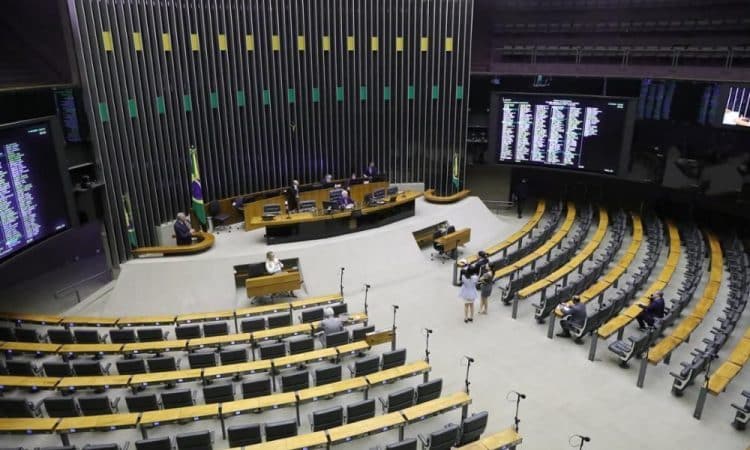Without a quorum, the Chamber closes its session in the middle of the night without completing the vote on the reinstatement

The Chamber was unable to complete the vote on the project for the gradual repayment of sector and municipal payrolls in the early hours of this Thursday (12).
The base text was approved at 11:55 pm, in the last minutes of Wednesday (11) — the score was 253 votes in favor, 67 against and four abstentions.
Afterwards, however, the deputies needed to analyze the highlights (suggestions for changes) to the text and the wording amendment.
At around 2:30 am this Thursday, with a quorum of 240 parliamentarians — 257 were needed — the president of the session, deputy Gilberto Nascimento (PSD-SP), decided to close it, after appeals from the deputies present — it was also possible to participate remotely in the session .
The vote must be concluded in an extraordinary session, scheduled for 9 am this Thursday. At that time, parliamentarians must finalize the vote on the drafting amendment.
The analysis of the drafting amendment lasted until 2:30 am amid attempts at obstruction by the opposition, but was interrupted due to the lack of a quorum of 257 deputies for the vote.
What is the reimbursement project?
The project creates alternatives to compensate for the payroll tax cuts in 17 economic sectors and municipalities. The exemption benefits economic sectors and small municipalities, which are currently exempt from the Social Security Contribution on Gross Revenue (CPRB).
If the final wording of the project is approved, the text goes to presidential approval.
Request to extend deadline
President Luiz Inácio Lula da Silva (PT) needed to sign the sanction by the end of Wednesday, the deadline established by the Federal Supreme Court (STF) for a solution on the matter.
Otherwise, the productive sectors and municipalities benefiting from the exemption would need to resume paying taxes from this Thursday (12).
At around 12:10 am, the Federal Attorney General’s Office (AGU) contacted the STF asking for the deadline to be extended by three days. “The exceptional granting of an additional period of three working days is necessary, solely in order to complete the legislative process in its final stage of sanction/veto by the President of the Republic”, stated in the request.
Rapporteur declined
Initially, the project’s rapporteur was the deputy Any Ortiz (PSD-RS). Voting started late, around 9:40 pm, because the congresswoman was not in Brasília.
However, at around 11pm, after arriving at the plenary, the deputy decided to abandon the report on the text. She defended that the gradual re-encumbrance harms the economic sectors, and criticized the fact that the vote took place hours before the deadline stipulated by the STF ends.
“For my principles, for everything that has guided me here today, unfortunately I cannot sign this report in the way it was done, within the deadline, without the possibility of building. As a federal deputy, I assume the responsibilities I have with the 17 sectors to avoid mass layoffs in this country”, stated the deputy.
The rapporteur for the text was deputy José Guimarães (PT-CE), leader of the government in the Chamber.
Gradual reinstatement
The project maintains the exemption during 2024, but establishes, from 2025, a gradual increase. The transition will last until 2027, with an increase of 5% each year from next year until reaching the 20% rate on the payroll in 2028.
In 2024, the government estimates that the tax relief will cost R$26.2 billion. Over the four years, even with the gradual re-encumbrance, the estimated cost, according to the rapporteur, is R$44 billion by 2027.
Compensation
The text determines that sectors will gradually return to paying taxes to the federal government between 2025 and 2027 – the year in which the rates will be fully collected again.
In the Senate, the proposal’s rapporteur and government leader, Jaques Wagner (PT-BA), defined eight ways to guarantee resources to compensate for the tax exemption between 2025 and 2027. The text approved by the Chamber maintained the alternatives proposed by Wagner.
The measures presented to compensate for the exemption are:
- updating the value of movable and immovable assets;
- updating the regime for declaring undeclared or incorrectly declared resources;
- Desenrola program for regulatory agencies;
- “fine-toothed comb” to investigate fraud in the payment of social benefits;
- recovery of “forgotten” resources in the financial system;
- fines for companies that fail to submit a declaration on tax benefits to the Federal Revenue, in addition to rules for adhering to new benefits;
- judicial and extrajudicial deposits.
Wording amendment
The drafting amendment that was not voted on due to lack of quorum intends to comply with a guideline made by the Central Bank (BC) this morning. In a technical note, the BC argued that the article in the text that deals with the recovery of “forgotten” resources in the financial system created legal uncertainty.
The text determines that the National Treasury can appropriate resources existing in deposit accounts in financial institutions whose records have not been updated in the manner defined by the National Monetary Council (CNM), and which have not been claimed within 30 days after the publication of the law . The Treasury estimates that this measure will bring R$8.6 billion to the public coffers.
The project also determined that the amounts would be considered as primary budget revenue for all statistical purposes used to calculate the primary result. This responsibility belongs to the Central Bank.
In the technical note, the BC argues that the project obliges the institution to promote primary surplus records. The wording amendment suggests removing the section that determined the entry of values in the calculation of the primary result. Deputies still need to approve this item.

